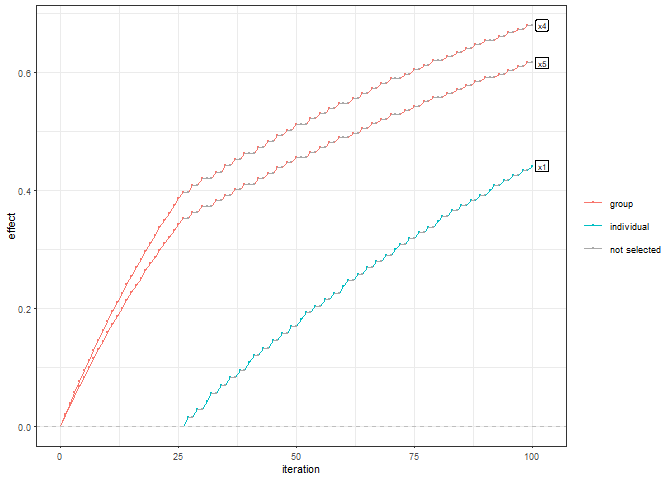
The hardware and bandwidth for this mirror is donated by METANET, the Webhosting and Full Service-Cloud Provider.
If you wish to report a bug, or if you are interested in having us mirror your free-software or open-source project, please feel free to contact us at mirror[@]metanet.ch.
sgboostImplements the sparse-group boosting in to be used conjunction with
the R-package mboost. A formula object defining group base
learners and individual base learners is used in the fitting process.
Regularization is based on the degrees of freedom of individual
baselearners \(df(\lambda)\) and the
ones of group baselearners \(df(\lambda^{(g)})\), such that \(df(\lambda) = \alpha\) and \(df(\lambda^{(g)}) = 1- \alpha\).
You can install the development version of sgboost from GitHub with:
# install.packages("devtools")
devtools::install_github("FabianObster/sgboost")This is a basic example which shows you how to solve a common problem:
library(sgboost)
library(dplyr)
library(mboost)For a data.frame df and a group structure
group_df, this example fits a sparse-group boosting model
and plots the coefficient path:
library(sgboost)
set.seed(1)
df <- data.frame(
x1 = rnorm(100), x2 = rnorm(100), x3 = rnorm(100),
x4 = rnorm(100), x5 = runif(100)
)
df <- df %>%
mutate_all(function(x) {
as.numeric(scale(x))
})
df$y <- df$x1 + df$x4 + df$x5
group_df <- data.frame(
group_name = c(1, 1, 1, 2, 2),
var_name = c("x1", "x2", "x3", "x4", "x5")
)
sgb_formula <- as.formula(create_formula(alpha = 0.3, group_df = group_df))
#> Warning in create_formula(alpha = 0.3, group_df = group_df): there is a group containing only one variable.
#> It will be treated as individual variable and as groupsgb_model <- mboost(formula = sgb_formula, data = df)
plot_path(sgb_model)
These binaries (installable software) and packages are in development.
They may not be fully stable and should be used with caution. We make no claims about them.